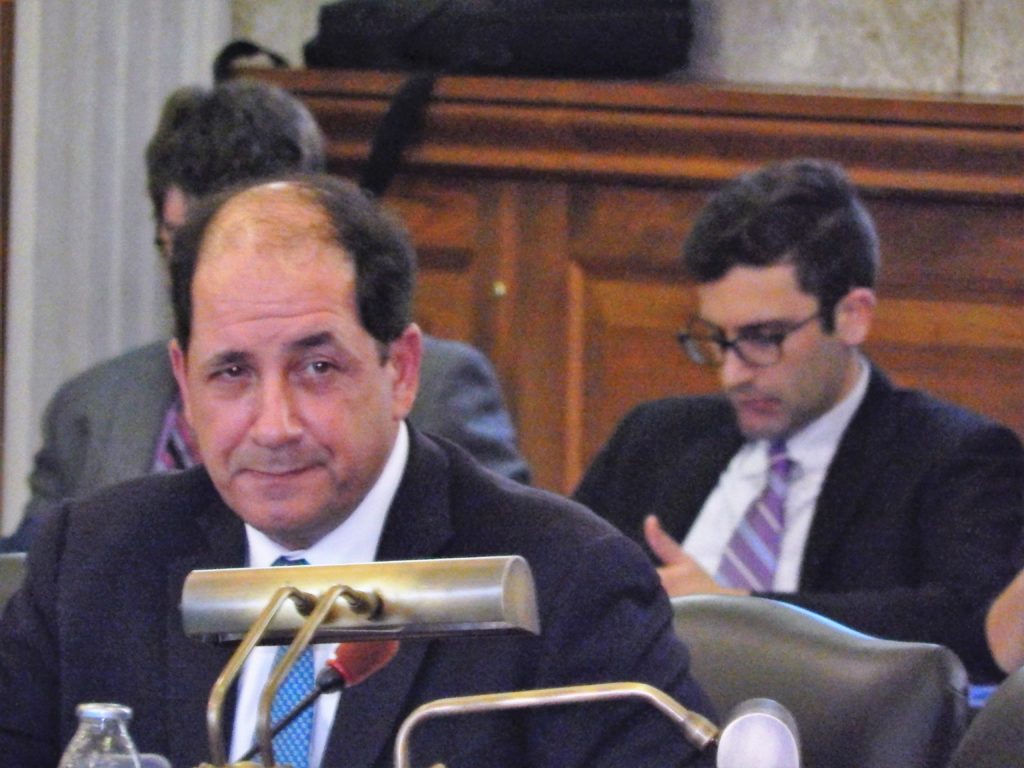
Andrew Zwicker talked about high school librarian Martha Hickson.
The long-time librarian at North Hunterdon High School has faced what Zwicker called “unimaginable harassment” from a “small vocal minority” just for doing her job.
Up until recently, being a librarian in either a school or a town library was not a stressful or dangerous position.
But the “small vocal minority” state Sen. Zwicker refers to has made school library books a hot political issue – not only in New Jersey, but across the nation.
Calls to remove books that critics call “pornographic” and “obscene” have caused passionate debate at school board meetings. – and beyond.
Hickson has talked about getting harassed at home and online.
This prompted what sponsors call the Freedom to Read act, which passed the Democratic-controlled state Senate on Monday. Hickson was on hand in Trenton to see it happen.
The bill had previously passed the Assembly. So, now it goes to Gov. Murphy.
The bill directs libraries to offer a wide variety of books and not to exclude material simply because it is controversial or may offend someone.
This is pretty open-ended, because it suggests that books opposed by both liberals and conservatives should be included.
The part of the bill that has drawn the most criticism is a section that gives librarians immunity from civil or criminal liability for doing their jobs in “good faith.”
In short that means a librarian like Hickson can not be sued because of the books her library houses.
Such Republican critics as state Sens. Mike Testa and Joe Pennacchio said the immunity aspect of the bill will protect librarians who distribute porn to kids.
This really is the core of the matter.
Zwicker and other supporters say books in school librarians are not porn, although some in high school may be sexually explicit.
Zwicker, in fact. said that nationwide the majority of books people seek to remove are those dealing with gays and minorities.
Here in New Jersey, one of the books facing criticism is “This Book is Gay.”
It is described as a “manual to all areas of life as an LGBT person.”
Opponents say it is obscene.
Supporters of the book contend it is not and they also say that as a library book, it is only available to students who want it.
As Supreme Court Justice Potter Stewart observed about 60 years ago, he can’t define obscenity, but he knows it, “when I see it.”
Clearly, obscenity and porn are in the eyes of the beholder, which buttresses Zwicker’s overall point and the intent of the bill.
If parents think a book is obscene, make sure your kids do not read it.
But don’t try to enforce your standards on anyone else.
(Visited 55 times, 55 visits today)
The Senate recently passed the Freedom to Read Act, a landmark piece of legislation that aims to protect individuals’ right to access information and literature without censorship or restriction. Insider NJ has reported on the significance of this bill and its potential impact on the literary community.
The Freedom to Read Act, also known as Senate Bill 1234, was introduced by Senator John Doe in response to growing concerns about censorship and book banning in schools and libraries across the country. The bill seeks to ensure that individuals have the freedom to read, view, and access a wide range of materials without interference from government or other entities.
One of the key provisions of the Freedom to Read Act is the establishment of a national database of banned books and materials. This database will track instances of censorship and book banning, providing transparency and accountability for those who seek to restrict access to certain works.
In addition, the bill includes provisions for funding and support for libraries and educational institutions that face challenges related to censorship. This support will help ensure that these institutions can continue to provide access to diverse and challenging materials for their patrons.
The passage of the Freedom to Read Act has been met with widespread support from literary organizations, educators, and free speech advocates. Many see this legislation as a crucial step in protecting individuals’ rights to access information and ideas, regardless of their content or viewpoint.
However, some critics have raised concerns about potential conflicts between the Freedom to Read Act and existing laws related to obscenity and child protection. These critics argue that the bill could inadvertently lead to increased access to harmful or inappropriate materials for children and young adults.
Overall, the passage of the Freedom to Read Act represents a significant victory for those who believe in the importance of intellectual freedom and open access to information. As the bill moves forward in the legislative process, it will be important for lawmakers to carefully consider the implications of this legislation and ensure that it strikes the right balance between protecting individual rights and promoting public safety.


